Report on Diversity: Personal Reflection on Cultural Plunge Experience
VerifiedAdded on 2020/07/22
|8
|2534
|256
Report
AI Summary
This report details a student's reflection on a cultural plunge, focusing on their social positioning and identity within a diverse context. The assignment begins with an examination of the student's self-perception and identity categories, followed by a justification for the chosen cultural plunge. The core of the report describes the plunge experience, including the individuals involved and the central events. The student reflects on their expectations of feeling like an 'other' and analyzes the resulting insights, decisions, and behaviors. The report concludes by identifying implications for the student's future as a teacher, emphasizing the importance of understanding and addressing issues of diversity and difference in interactions with staff, students, and families. The student connects their experiences to course readings and relevant concepts of social justice and inclusion.
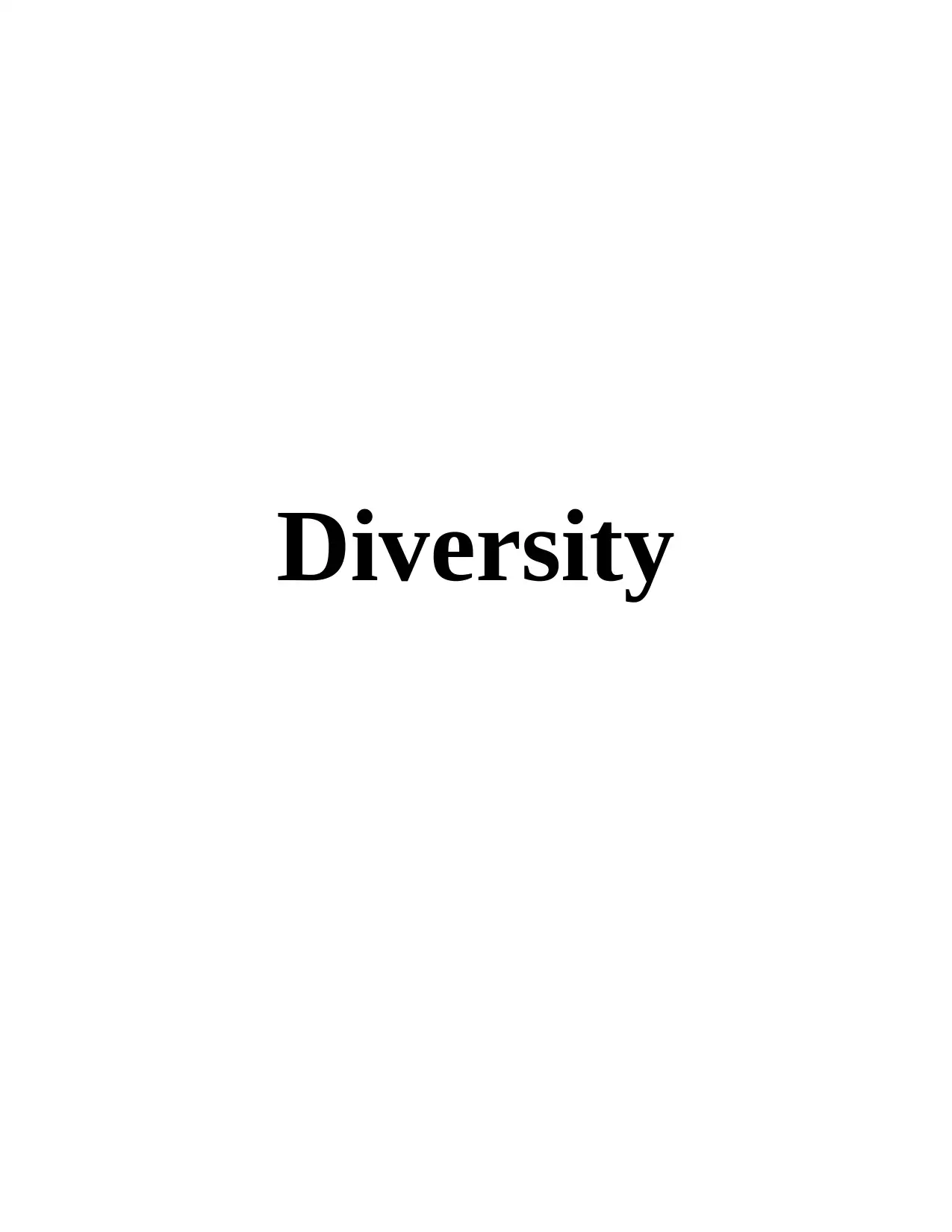
Diversity
Paraphrase This Document
Need a fresh take? Get an instant paraphrase of this document with our AI Paraphraser
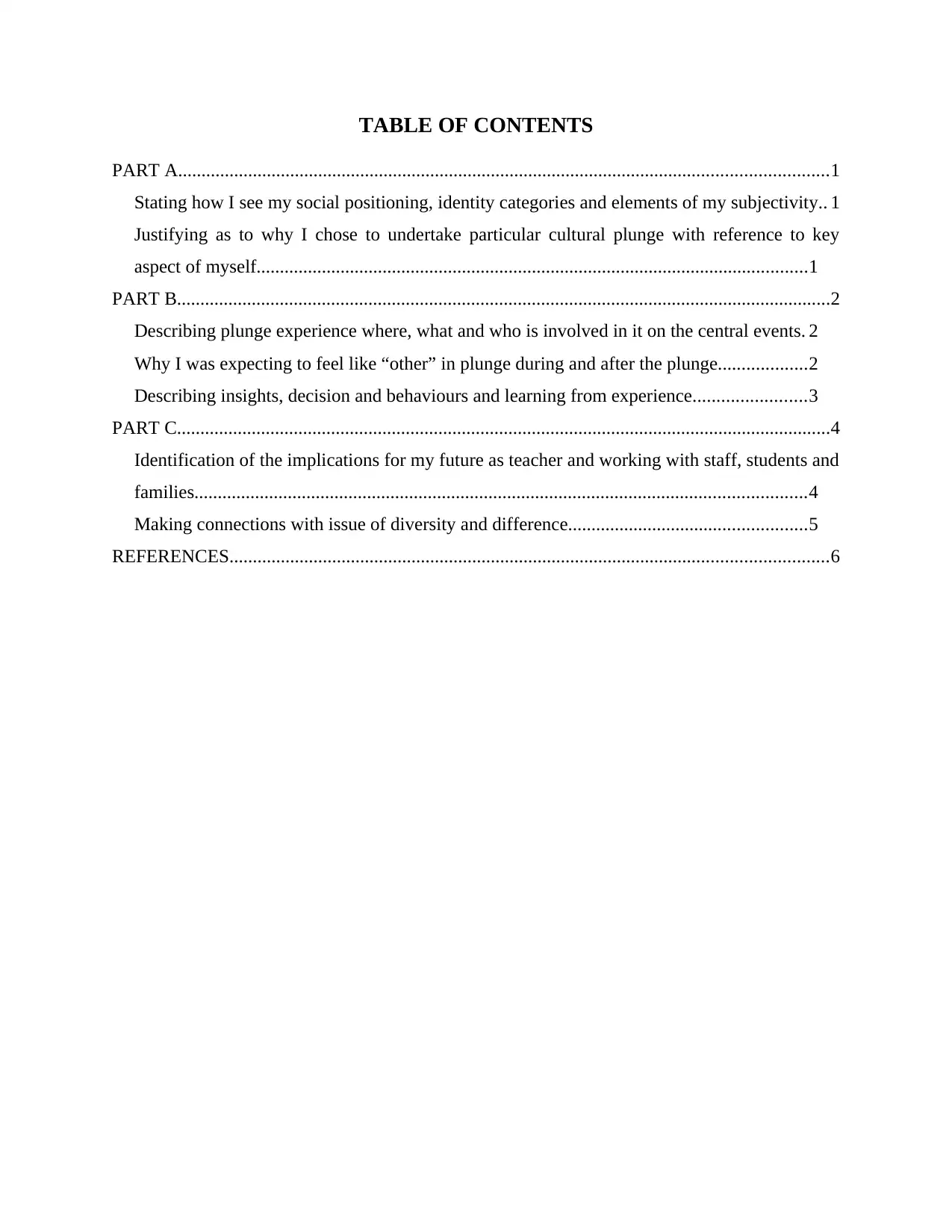
TABLE OF CONTENTS
PART A...........................................................................................................................................1
Stating how I see my social positioning, identity categories and elements of my subjectivity.. 1
Justifying as to why I chose to undertake particular cultural plunge with reference to key
aspect of myself......................................................................................................................1
PART B............................................................................................................................................2
Describing plunge experience where, what and who is involved in it on the central events. 2
Why I was expecting to feel like “other” in plunge during and after the plunge...................2
Describing insights, decision and behaviours and learning from experience........................3
PART C............................................................................................................................................4
Identification of the implications for my future as teacher and working with staff, students and
families...................................................................................................................................4
Making connections with issue of diversity and difference...................................................5
REFERENCES................................................................................................................................6
PART A...........................................................................................................................................1
Stating how I see my social positioning, identity categories and elements of my subjectivity.. 1
Justifying as to why I chose to undertake particular cultural plunge with reference to key
aspect of myself......................................................................................................................1
PART B............................................................................................................................................2
Describing plunge experience where, what and who is involved in it on the central events. 2
Why I was expecting to feel like “other” in plunge during and after the plunge...................2
Describing insights, decision and behaviours and learning from experience........................3
PART C............................................................................................................................................4
Identification of the implications for my future as teacher and working with staff, students and
families...................................................................................................................................4
Making connections with issue of diversity and difference...................................................5
REFERENCES................................................................................................................................6
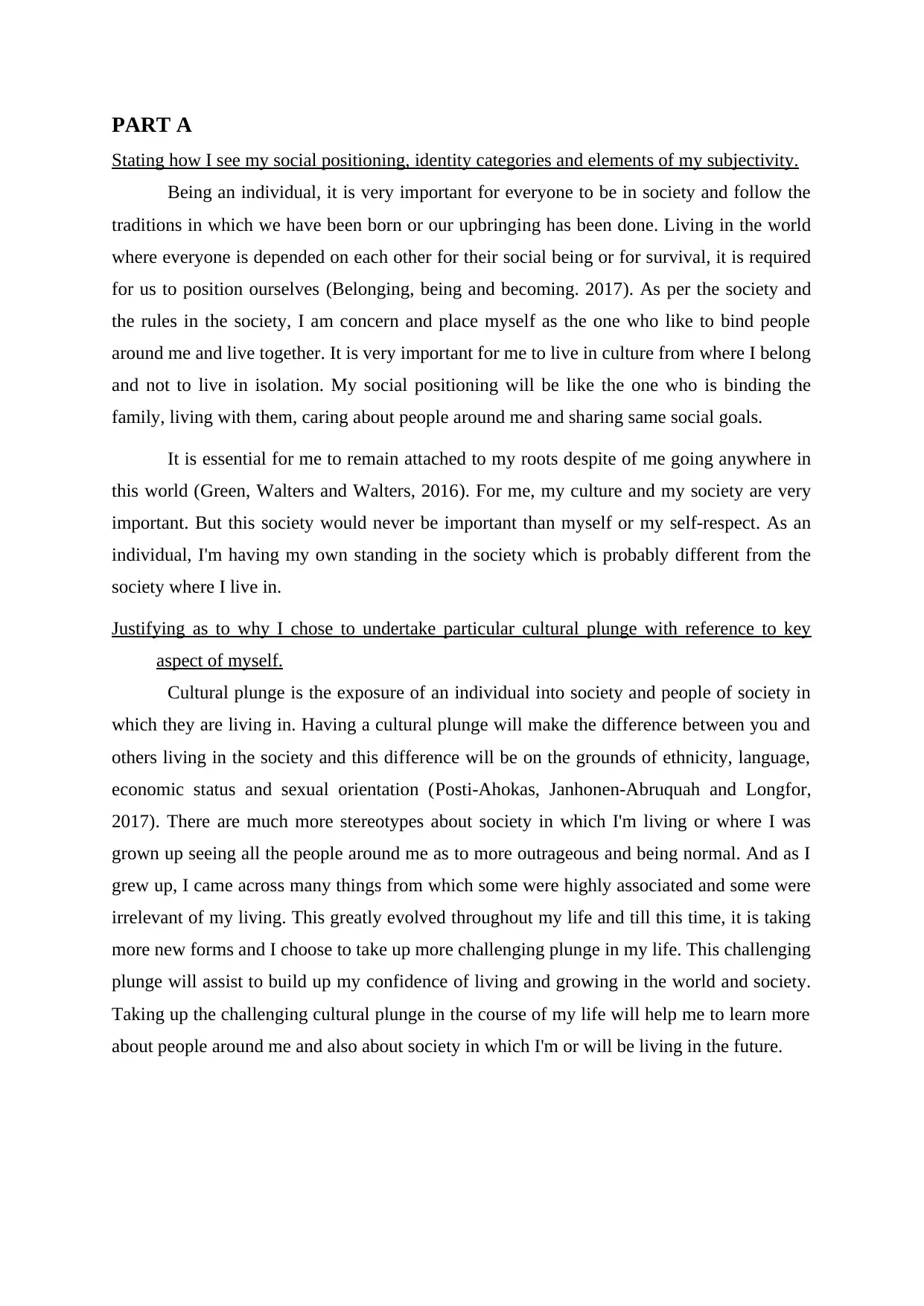
PART A
Stating how I see my social positioning, identity categories and elements of my subjectivity.
Being an individual, it is very important for everyone to be in society and follow the
traditions in which we have been born or our upbringing has been done. Living in the world
where everyone is depended on each other for their social being or for survival, it is required
for us to position ourselves (Belonging, being and becoming. 2017). As per the society and
the rules in the society, I am concern and place myself as the one who like to bind people
around me and live together. It is very important for me to live in culture from where I belong
and not to live in isolation. My social positioning will be like the one who is binding the
family, living with them, caring about people around me and sharing same social goals.
It is essential for me to remain attached to my roots despite of me going anywhere in
this world (Green, Walters and Walters, 2016). For me, my culture and my society are very
important. But this society would never be important than myself or my self-respect. As an
individual, I'm having my own standing in the society which is probably different from the
society where I live in.
Justifying as to why I chose to undertake particular cultural plunge with reference to key
aspect of myself.
Cultural plunge is the exposure of an individual into society and people of society in
which they are living in. Having a cultural plunge will make the difference between you and
others living in the society and this difference will be on the grounds of ethnicity, language,
economic status and sexual orientation (Posti-Ahokas, Janhonen-Abruquah and Longfor,
2017). There are much more stereotypes about society in which I'm living or where I was
grown up seeing all the people around me as to more outrageous and being normal. And as I
grew up, I came across many things from which some were highly associated and some were
irrelevant of my living. This greatly evolved throughout my life and till this time, it is taking
more new forms and I choose to take up more challenging plunge in my life. This challenging
plunge will assist to build up my confidence of living and growing in the world and society.
Taking up the challenging cultural plunge in the course of my life will help me to learn more
about people around me and also about society in which I'm or will be living in the future.
Stating how I see my social positioning, identity categories and elements of my subjectivity.
Being an individual, it is very important for everyone to be in society and follow the
traditions in which we have been born or our upbringing has been done. Living in the world
where everyone is depended on each other for their social being or for survival, it is required
for us to position ourselves (Belonging, being and becoming. 2017). As per the society and
the rules in the society, I am concern and place myself as the one who like to bind people
around me and live together. It is very important for me to live in culture from where I belong
and not to live in isolation. My social positioning will be like the one who is binding the
family, living with them, caring about people around me and sharing same social goals.
It is essential for me to remain attached to my roots despite of me going anywhere in
this world (Green, Walters and Walters, 2016). For me, my culture and my society are very
important. But this society would never be important than myself or my self-respect. As an
individual, I'm having my own standing in the society which is probably different from the
society where I live in.
Justifying as to why I chose to undertake particular cultural plunge with reference to key
aspect of myself.
Cultural plunge is the exposure of an individual into society and people of society in
which they are living in. Having a cultural plunge will make the difference between you and
others living in the society and this difference will be on the grounds of ethnicity, language,
economic status and sexual orientation (Posti-Ahokas, Janhonen-Abruquah and Longfor,
2017). There are much more stereotypes about society in which I'm living or where I was
grown up seeing all the people around me as to more outrageous and being normal. And as I
grew up, I came across many things from which some were highly associated and some were
irrelevant of my living. This greatly evolved throughout my life and till this time, it is taking
more new forms and I choose to take up more challenging plunge in my life. This challenging
plunge will assist to build up my confidence of living and growing in the world and society.
Taking up the challenging cultural plunge in the course of my life will help me to learn more
about people around me and also about society in which I'm or will be living in the future.
⊘ This is a preview!⊘
Do you want full access?
Subscribe today to unlock all pages.

Trusted by 1+ million students worldwide
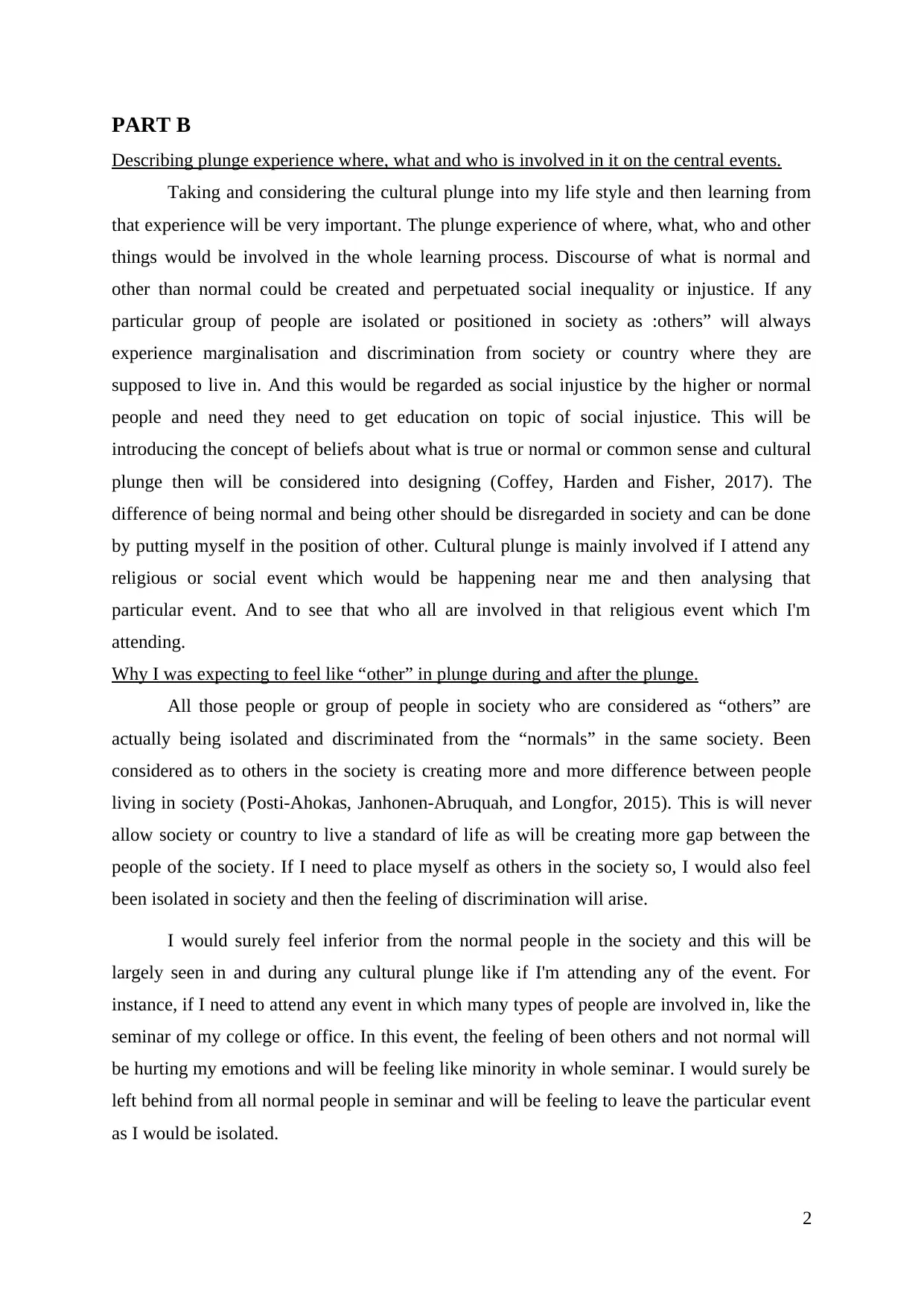
PART B
Describing plunge experience where, what and who is involved in it on the central events.
Taking and considering the cultural plunge into my life style and then learning from
that experience will be very important. The plunge experience of where, what, who and other
things would be involved in the whole learning process. Discourse of what is normal and
other than normal could be created and perpetuated social inequality or injustice. If any
particular group of people are isolated or positioned in society as :others” will always
experience marginalisation and discrimination from society or country where they are
supposed to live in. And this would be regarded as social injustice by the higher or normal
people and need they need to get education on topic of social injustice. This will be
introducing the concept of beliefs about what is true or normal or common sense and cultural
plunge then will be considered into designing (Coffey, Harden and Fisher, 2017). The
difference of being normal and being other should be disregarded in society and can be done
by putting myself in the position of other. Cultural plunge is mainly involved if I attend any
religious or social event which would be happening near me and then analysing that
particular event. And to see that who all are involved in that religious event which I'm
attending.
Why I was expecting to feel like “other” in plunge during and after the plunge.
All those people or group of people in society who are considered as “others” are
actually being isolated and discriminated from the “normals” in the same society. Been
considered as to others in the society is creating more and more difference between people
living in society (Posti-Ahokas, Janhonen-Abruquah, and Longfor, 2015). This is will never
allow society or country to live a standard of life as will be creating more gap between the
people of the society. If I need to place myself as others in the society so, I would also feel
been isolated in society and then the feeling of discrimination will arise.
I would surely feel inferior from the normal people in the society and this will be
largely seen in and during any cultural plunge like if I'm attending any of the event. For
instance, if I need to attend any event in which many types of people are involved in, like the
seminar of my college or office. In this event, the feeling of been others and not normal will
be hurting my emotions and will be feeling like minority in whole seminar. I would surely be
left behind from all normal people in seminar and will be feeling to leave the particular event
as I would be isolated.
2
Describing plunge experience where, what and who is involved in it on the central events.
Taking and considering the cultural plunge into my life style and then learning from
that experience will be very important. The plunge experience of where, what, who and other
things would be involved in the whole learning process. Discourse of what is normal and
other than normal could be created and perpetuated social inequality or injustice. If any
particular group of people are isolated or positioned in society as :others” will always
experience marginalisation and discrimination from society or country where they are
supposed to live in. And this would be regarded as social injustice by the higher or normal
people and need they need to get education on topic of social injustice. This will be
introducing the concept of beliefs about what is true or normal or common sense and cultural
plunge then will be considered into designing (Coffey, Harden and Fisher, 2017). The
difference of being normal and being other should be disregarded in society and can be done
by putting myself in the position of other. Cultural plunge is mainly involved if I attend any
religious or social event which would be happening near me and then analysing that
particular event. And to see that who all are involved in that religious event which I'm
attending.
Why I was expecting to feel like “other” in plunge during and after the plunge.
All those people or group of people in society who are considered as “others” are
actually being isolated and discriminated from the “normals” in the same society. Been
considered as to others in the society is creating more and more difference between people
living in society (Posti-Ahokas, Janhonen-Abruquah, and Longfor, 2015). This is will never
allow society or country to live a standard of life as will be creating more gap between the
people of the society. If I need to place myself as others in the society so, I would also feel
been isolated in society and then the feeling of discrimination will arise.
I would surely feel inferior from the normal people in the society and this will be
largely seen in and during any cultural plunge like if I'm attending any of the event. For
instance, if I need to attend any event in which many types of people are involved in, like the
seminar of my college or office. In this event, the feeling of been others and not normal will
be hurting my emotions and will be feeling like minority in whole seminar. I would surely be
left behind from all normal people in seminar and will be feeling to leave the particular event
as I would be isolated.
2
Paraphrase This Document
Need a fresh take? Get an instant paraphrase of this document with our AI Paraphraser
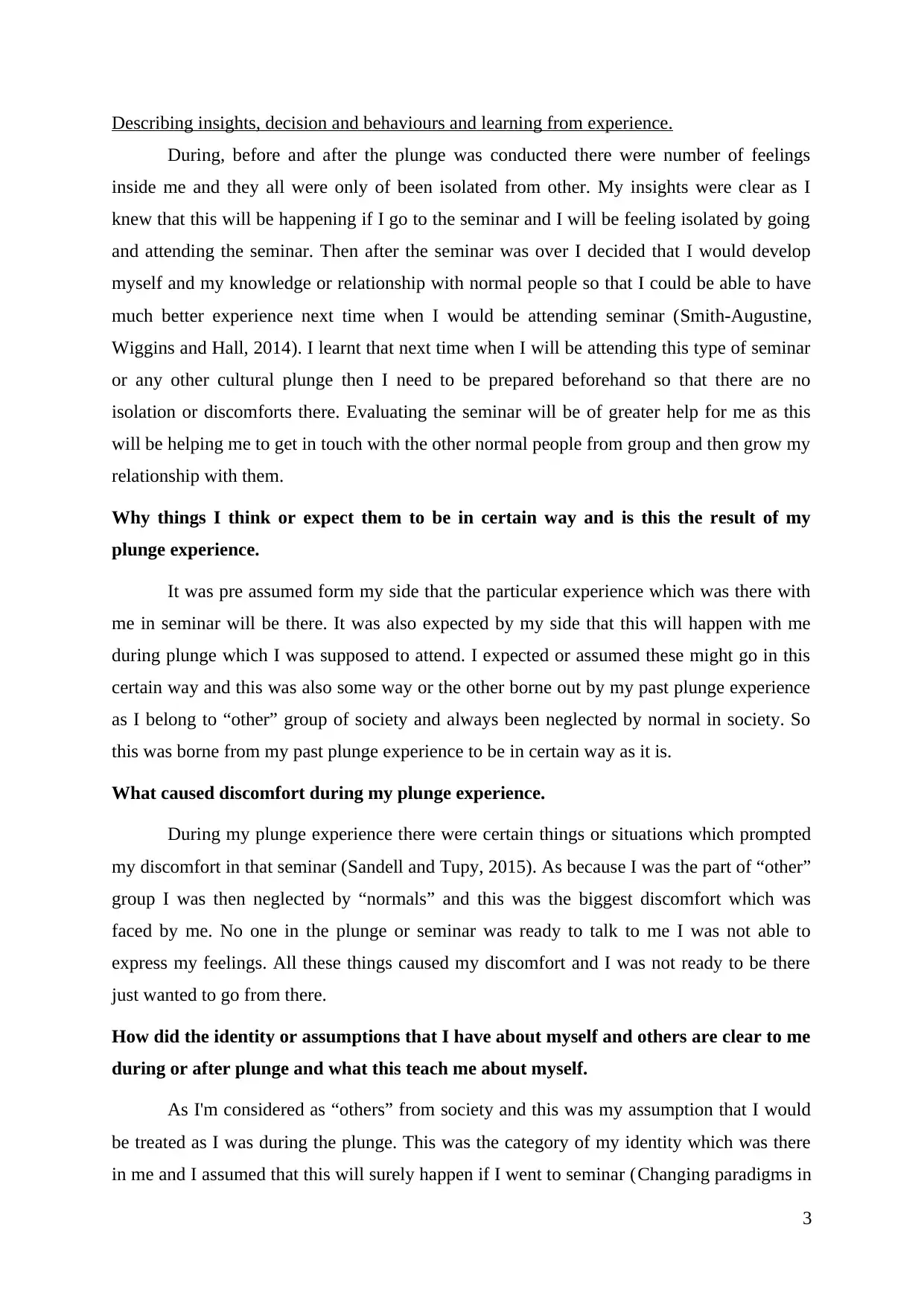
Describing insights, decision and behaviours and learning from experience.
During, before and after the plunge was conducted there were number of feelings
inside me and they all were only of been isolated from other. My insights were clear as I
knew that this will be happening if I go to the seminar and I will be feeling isolated by going
and attending the seminar. Then after the seminar was over I decided that I would develop
myself and my knowledge or relationship with normal people so that I could be able to have
much better experience next time when I would be attending seminar (Smith-Augustine,
Wiggins and Hall, 2014). I learnt that next time when I will be attending this type of seminar
or any other cultural plunge then I need to be prepared beforehand so that there are no
isolation or discomforts there. Evaluating the seminar will be of greater help for me as this
will be helping me to get in touch with the other normal people from group and then grow my
relationship with them.
Why things I think or expect them to be in certain way and is this the result of my
plunge experience.
It was pre assumed form my side that the particular experience which was there with
me in seminar will be there. It was also expected by my side that this will happen with me
during plunge which I was supposed to attend. I expected or assumed these might go in this
certain way and this was also some way or the other borne out by my past plunge experience
as I belong to “other” group of society and always been neglected by normal in society. So
this was borne from my past plunge experience to be in certain way as it is.
What caused discomfort during my plunge experience.
During my plunge experience there were certain things or situations which prompted
my discomfort in that seminar (Sandell and Tupy, 2015). As because I was the part of “other”
group I was then neglected by “normals” and this was the biggest discomfort which was
faced by me. No one in the plunge or seminar was ready to talk to me I was not able to
express my feelings. All these things caused my discomfort and I was not ready to be there
just wanted to go from there.
How did the identity or assumptions that I have about myself and others are clear to me
during or after plunge and what this teach me about myself.
As I'm considered as “others” from society and this was my assumption that I would
be treated as I was during the plunge. This was the category of my identity which was there
in me and I assumed that this will surely happen if I went to seminar (Changing paradigms in
3
During, before and after the plunge was conducted there were number of feelings
inside me and they all were only of been isolated from other. My insights were clear as I
knew that this will be happening if I go to the seminar and I will be feeling isolated by going
and attending the seminar. Then after the seminar was over I decided that I would develop
myself and my knowledge or relationship with normal people so that I could be able to have
much better experience next time when I would be attending seminar (Smith-Augustine,
Wiggins and Hall, 2014). I learnt that next time when I will be attending this type of seminar
or any other cultural plunge then I need to be prepared beforehand so that there are no
isolation or discomforts there. Evaluating the seminar will be of greater help for me as this
will be helping me to get in touch with the other normal people from group and then grow my
relationship with them.
Why things I think or expect them to be in certain way and is this the result of my
plunge experience.
It was pre assumed form my side that the particular experience which was there with
me in seminar will be there. It was also expected by my side that this will happen with me
during plunge which I was supposed to attend. I expected or assumed these might go in this
certain way and this was also some way or the other borne out by my past plunge experience
as I belong to “other” group of society and always been neglected by normal in society. So
this was borne from my past plunge experience to be in certain way as it is.
What caused discomfort during my plunge experience.
During my plunge experience there were certain things or situations which prompted
my discomfort in that seminar (Sandell and Tupy, 2015). As because I was the part of “other”
group I was then neglected by “normals” and this was the biggest discomfort which was
faced by me. No one in the plunge or seminar was ready to talk to me I was not able to
express my feelings. All these things caused my discomfort and I was not ready to be there
just wanted to go from there.
How did the identity or assumptions that I have about myself and others are clear to me
during or after plunge and what this teach me about myself.
As I'm considered as “others” from society and this was my assumption that I would
be treated as I was during the plunge. This was the category of my identity which was there
in me and I assumed that this will surely happen if I went to seminar (Changing paradigms in
3
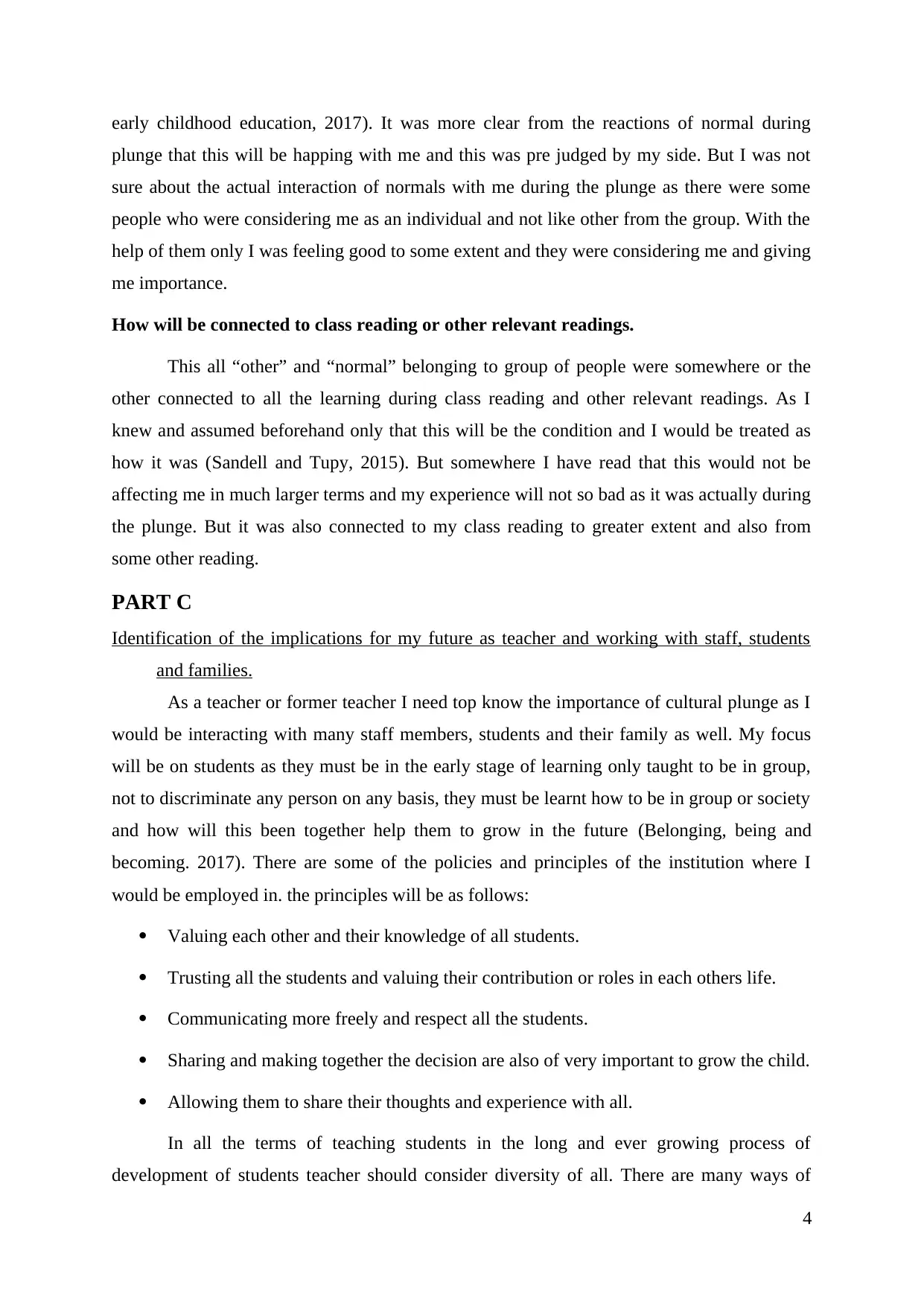
early childhood education, 2017). It was more clear from the reactions of normal during
plunge that this will be happing with me and this was pre judged by my side. But I was not
sure about the actual interaction of normals with me during the plunge as there were some
people who were considering me as an individual and not like other from the group. With the
help of them only I was feeling good to some extent and they were considering me and giving
me importance.
How will be connected to class reading or other relevant readings.
This all “other” and “normal” belonging to group of people were somewhere or the
other connected to all the learning during class reading and other relevant readings. As I
knew and assumed beforehand only that this will be the condition and I would be treated as
how it was (Sandell and Tupy, 2015). But somewhere I have read that this would not be
affecting me in much larger terms and my experience will not so bad as it was actually during
the plunge. But it was also connected to my class reading to greater extent and also from
some other reading.
PART C
Identification of the implications for my future as teacher and working with staff, students
and families.
As a teacher or former teacher I need top know the importance of cultural plunge as I
would be interacting with many staff members, students and their family as well. My focus
will be on students as they must be in the early stage of learning only taught to be in group,
not to discriminate any person on any basis, they must be learnt how to be in group or society
and how will this been together help them to grow in the future (Belonging, being and
becoming. 2017). There are some of the policies and principles of the institution where I
would be employed in. the principles will be as follows:
Valuing each other and their knowledge of all students.
Trusting all the students and valuing their contribution or roles in each others life.
Communicating more freely and respect all the students.
Sharing and making together the decision are also of very important to grow the child.
Allowing them to share their thoughts and experience with all.
In all the terms of teaching students in the long and ever growing process of
development of students teacher should consider diversity of all. There are many ways of
4
plunge that this will be happing with me and this was pre judged by my side. But I was not
sure about the actual interaction of normals with me during the plunge as there were some
people who were considering me as an individual and not like other from the group. With the
help of them only I was feeling good to some extent and they were considering me and giving
me importance.
How will be connected to class reading or other relevant readings.
This all “other” and “normal” belonging to group of people were somewhere or the
other connected to all the learning during class reading and other relevant readings. As I
knew and assumed beforehand only that this will be the condition and I would be treated as
how it was (Sandell and Tupy, 2015). But somewhere I have read that this would not be
affecting me in much larger terms and my experience will not so bad as it was actually during
the plunge. But it was also connected to my class reading to greater extent and also from
some other reading.
PART C
Identification of the implications for my future as teacher and working with staff, students
and families.
As a teacher or former teacher I need top know the importance of cultural plunge as I
would be interacting with many staff members, students and their family as well. My focus
will be on students as they must be in the early stage of learning only taught to be in group,
not to discriminate any person on any basis, they must be learnt how to be in group or society
and how will this been together help them to grow in the future (Belonging, being and
becoming. 2017). There are some of the policies and principles of the institution where I
would be employed in. the principles will be as follows:
Valuing each other and their knowledge of all students.
Trusting all the students and valuing their contribution or roles in each others life.
Communicating more freely and respect all the students.
Sharing and making together the decision are also of very important to grow the child.
Allowing them to share their thoughts and experience with all.
In all the terms of teaching students in the long and ever growing process of
development of students teacher should consider diversity of all. There are many ways of
4
⊘ This is a preview!⊘
Do you want full access?
Subscribe today to unlock all pages.

Trusted by 1+ million students worldwide
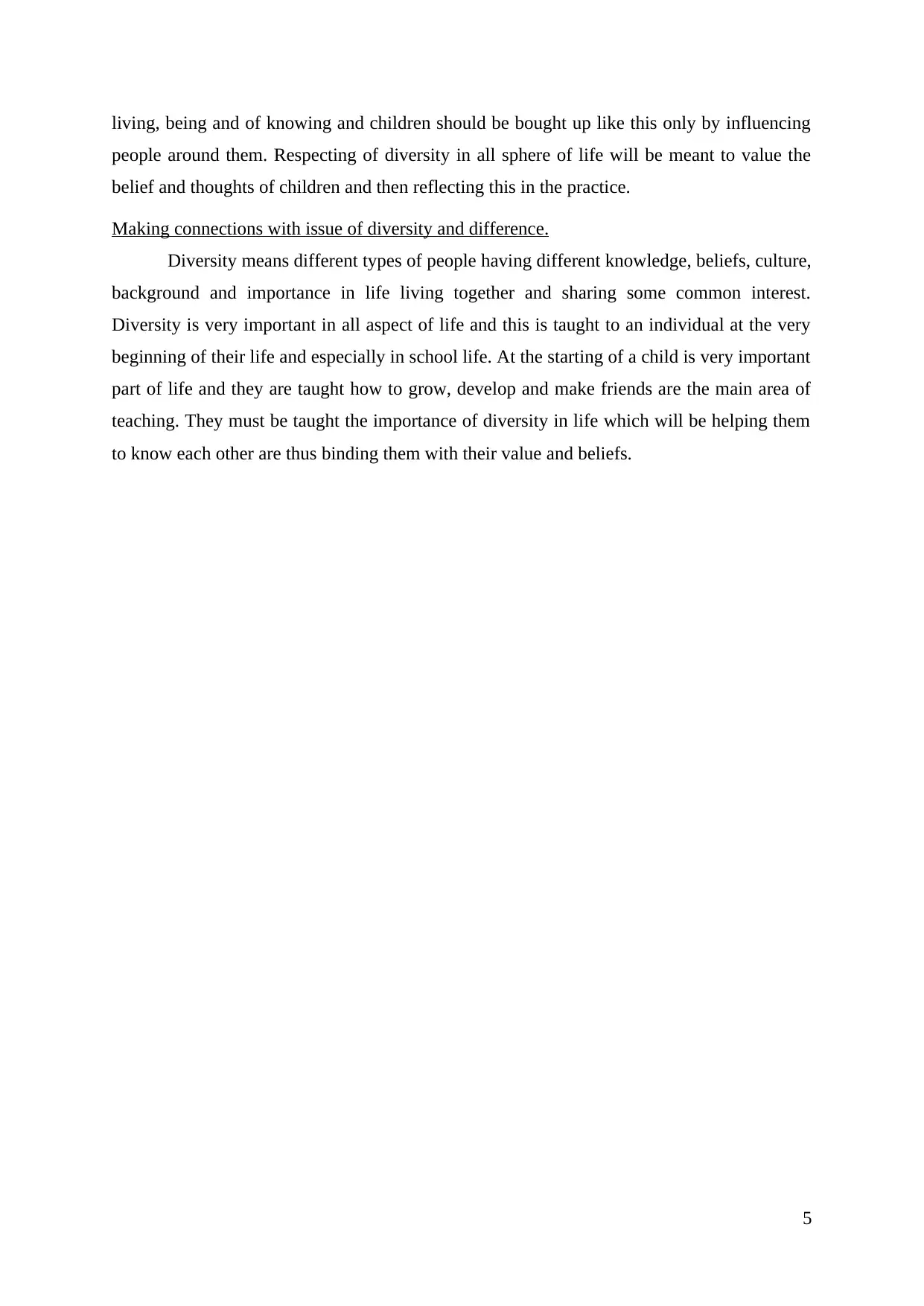
living, being and of knowing and children should be bought up like this only by influencing
people around them. Respecting of diversity in all sphere of life will be meant to value the
belief and thoughts of children and then reflecting this in the practice.
Making connections with issue of diversity and difference.
Diversity means different types of people having different knowledge, beliefs, culture,
background and importance in life living together and sharing some common interest.
Diversity is very important in all aspect of life and this is taught to an individual at the very
beginning of their life and especially in school life. At the starting of a child is very important
part of life and they are taught how to grow, develop and make friends are the main area of
teaching. They must be taught the importance of diversity in life which will be helping them
to know each other are thus binding them with their value and beliefs.
5
people around them. Respecting of diversity in all sphere of life will be meant to value the
belief and thoughts of children and then reflecting this in the practice.
Making connections with issue of diversity and difference.
Diversity means different types of people having different knowledge, beliefs, culture,
background and importance in life living together and sharing some common interest.
Diversity is very important in all aspect of life and this is taught to an individual at the very
beginning of their life and especially in school life. At the starting of a child is very important
part of life and they are taught how to grow, develop and make friends are the main area of
teaching. They must be taught the importance of diversity in life which will be helping them
to know each other are thus binding them with their value and beliefs.
5
Paraphrase This Document
Need a fresh take? Get an instant paraphrase of this document with our AI Paraphraser
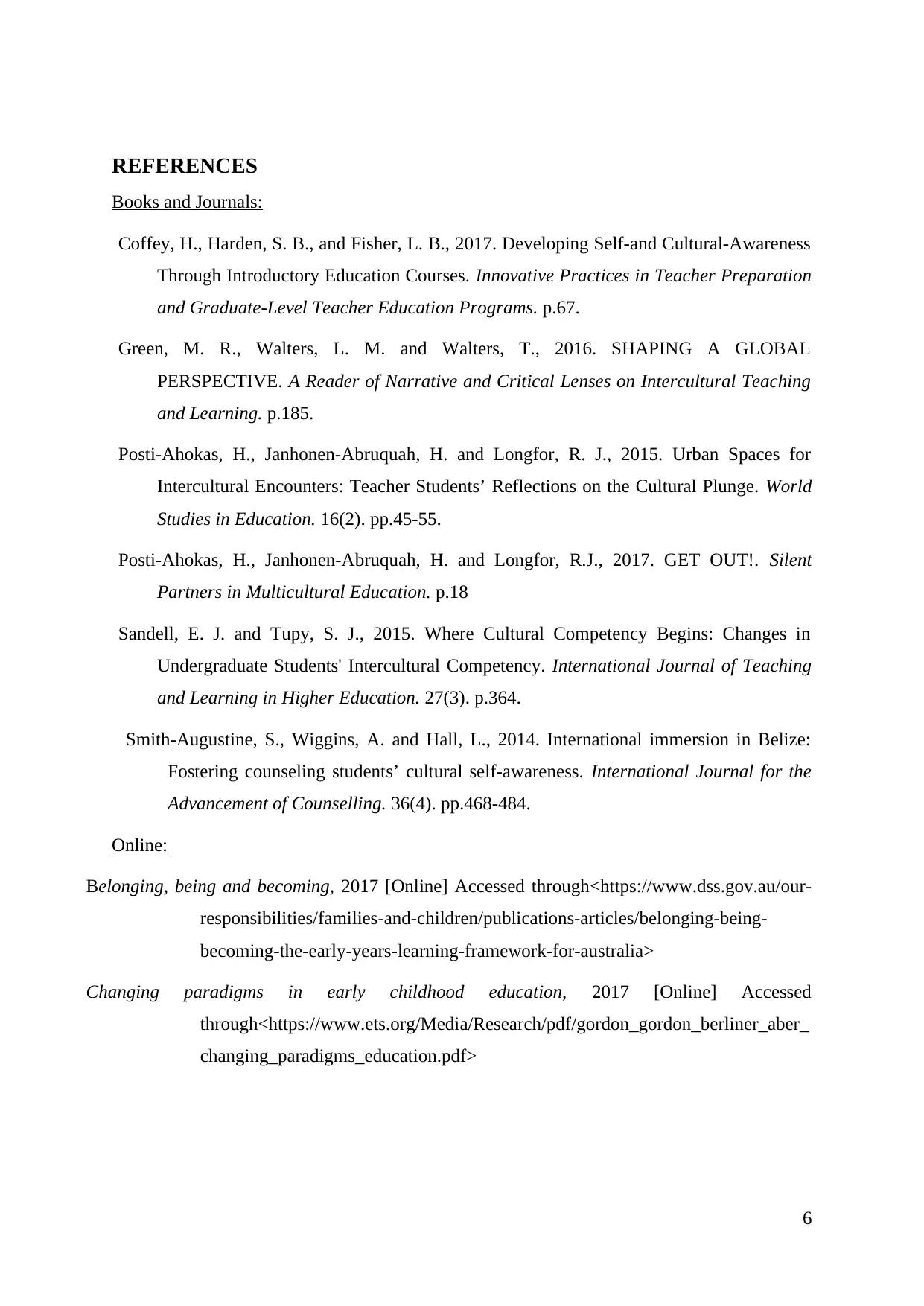
REFERENCES
Books and Journals:
Coffey, H., Harden, S. B., and Fisher, L. B., 2017. Developing Self-and Cultural-Awareness
Through Introductory Education Courses. Innovative Practices in Teacher Preparation
and Graduate-Level Teacher Education Programs. p.67.
Green, M. R., Walters, L. M. and Walters, T., 2016. SHAPING A GLOBAL
PERSPECTIVE. A Reader of Narrative and Critical Lenses on Intercultural Teaching
and Learning. p.185.
Posti-Ahokas, H., Janhonen-Abruquah, H. and Longfor, R. J., 2015. Urban Spaces for
Intercultural Encounters: Teacher Students’ Reflections on the Cultural Plunge. World
Studies in Education. 16(2). pp.45-55.
Posti-Ahokas, H., Janhonen-Abruquah, H. and Longfor, R.J., 2017. GET OUT!. Silent
Partners in Multicultural Education. p.18
Sandell, E. J. and Tupy, S. J., 2015. Where Cultural Competency Begins: Changes in
Undergraduate Students' Intercultural Competency. International Journal of Teaching
and Learning in Higher Education. 27(3). p.364.
Smith-Augustine, S., Wiggins, A. and Hall, L., 2014. International immersion in Belize:
Fostering counseling students’ cultural self-awareness. International Journal for the
Advancement of Counselling. 36(4). pp.468-484.
Online:
Belonging, being and becoming, 2017 [Online] Accessed through<https://www.dss.gov.au/our-
responsibilities/families-and-children/publications-articles/belonging-being-
becoming-the-early-years-learning-framework-for-australia>
Changing paradigms in early childhood education, 2017 [Online] Accessed
through<https://www.ets.org/Media/Research/pdf/gordon_gordon_berliner_aber_
changing_paradigms_education.pdf>
6
Books and Journals:
Coffey, H., Harden, S. B., and Fisher, L. B., 2017. Developing Self-and Cultural-Awareness
Through Introductory Education Courses. Innovative Practices in Teacher Preparation
and Graduate-Level Teacher Education Programs. p.67.
Green, M. R., Walters, L. M. and Walters, T., 2016. SHAPING A GLOBAL
PERSPECTIVE. A Reader of Narrative and Critical Lenses on Intercultural Teaching
and Learning. p.185.
Posti-Ahokas, H., Janhonen-Abruquah, H. and Longfor, R. J., 2015. Urban Spaces for
Intercultural Encounters: Teacher Students’ Reflections on the Cultural Plunge. World
Studies in Education. 16(2). pp.45-55.
Posti-Ahokas, H., Janhonen-Abruquah, H. and Longfor, R.J., 2017. GET OUT!. Silent
Partners in Multicultural Education. p.18
Sandell, E. J. and Tupy, S. J., 2015. Where Cultural Competency Begins: Changes in
Undergraduate Students' Intercultural Competency. International Journal of Teaching
and Learning in Higher Education. 27(3). p.364.
Smith-Augustine, S., Wiggins, A. and Hall, L., 2014. International immersion in Belize:
Fostering counseling students’ cultural self-awareness. International Journal for the
Advancement of Counselling. 36(4). pp.468-484.
Online:
Belonging, being and becoming, 2017 [Online] Accessed through<https://www.dss.gov.au/our-
responsibilities/families-and-children/publications-articles/belonging-being-
becoming-the-early-years-learning-framework-for-australia>
Changing paradigms in early childhood education, 2017 [Online] Accessed
through<https://www.ets.org/Media/Research/pdf/gordon_gordon_berliner_aber_
changing_paradigms_education.pdf>
6
1 out of 8
Related Documents
Your All-in-One AI-Powered Toolkit for Academic Success.
+13062052269
info@desklib.com
Available 24*7 on WhatsApp / Email
![[object Object]](/_next/static/media/star-bottom.7253800d.svg)
Unlock your academic potential
Copyright © 2020–2026 A2Z Services. All Rights Reserved. Developed and managed by ZUCOL.





